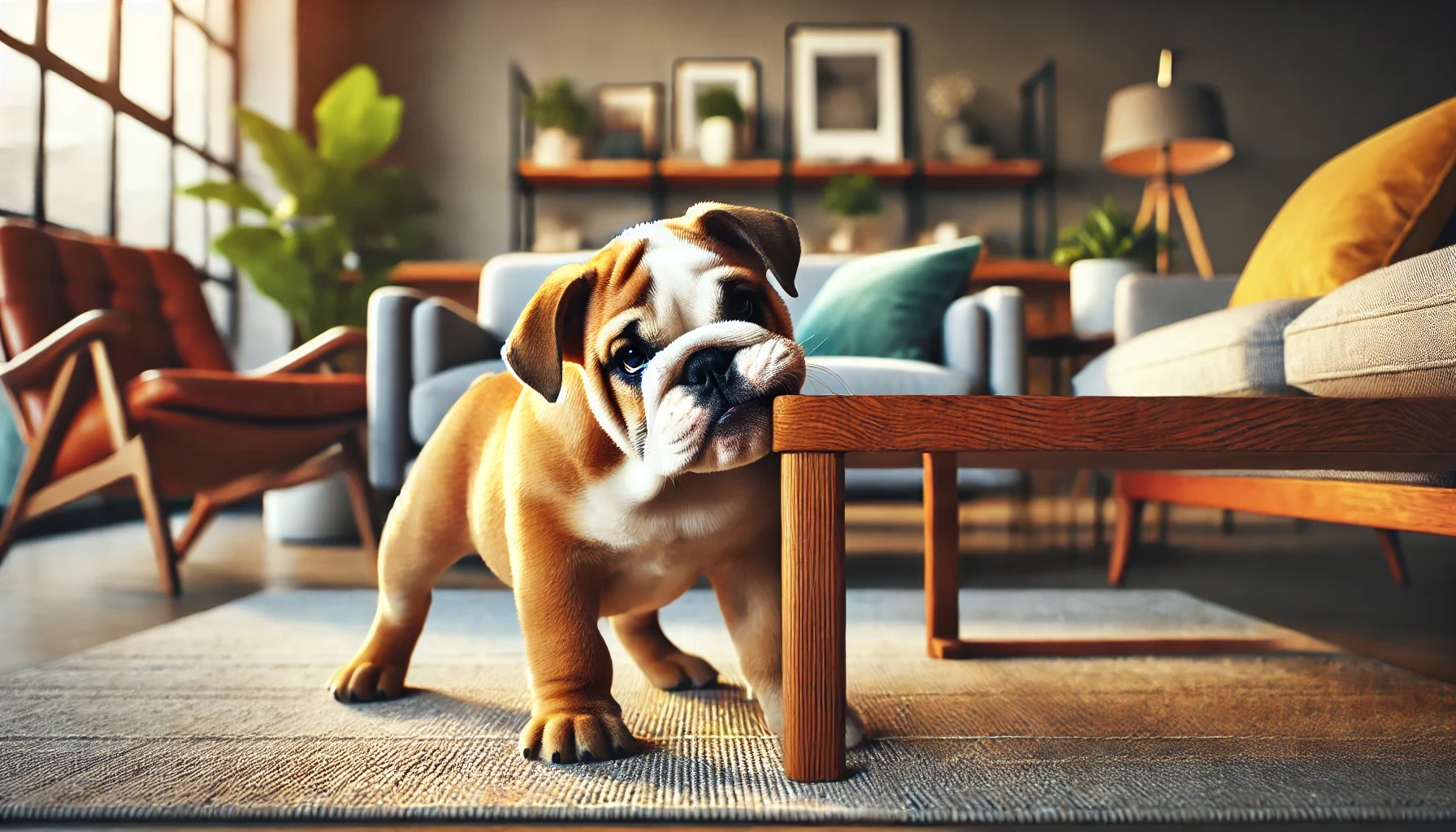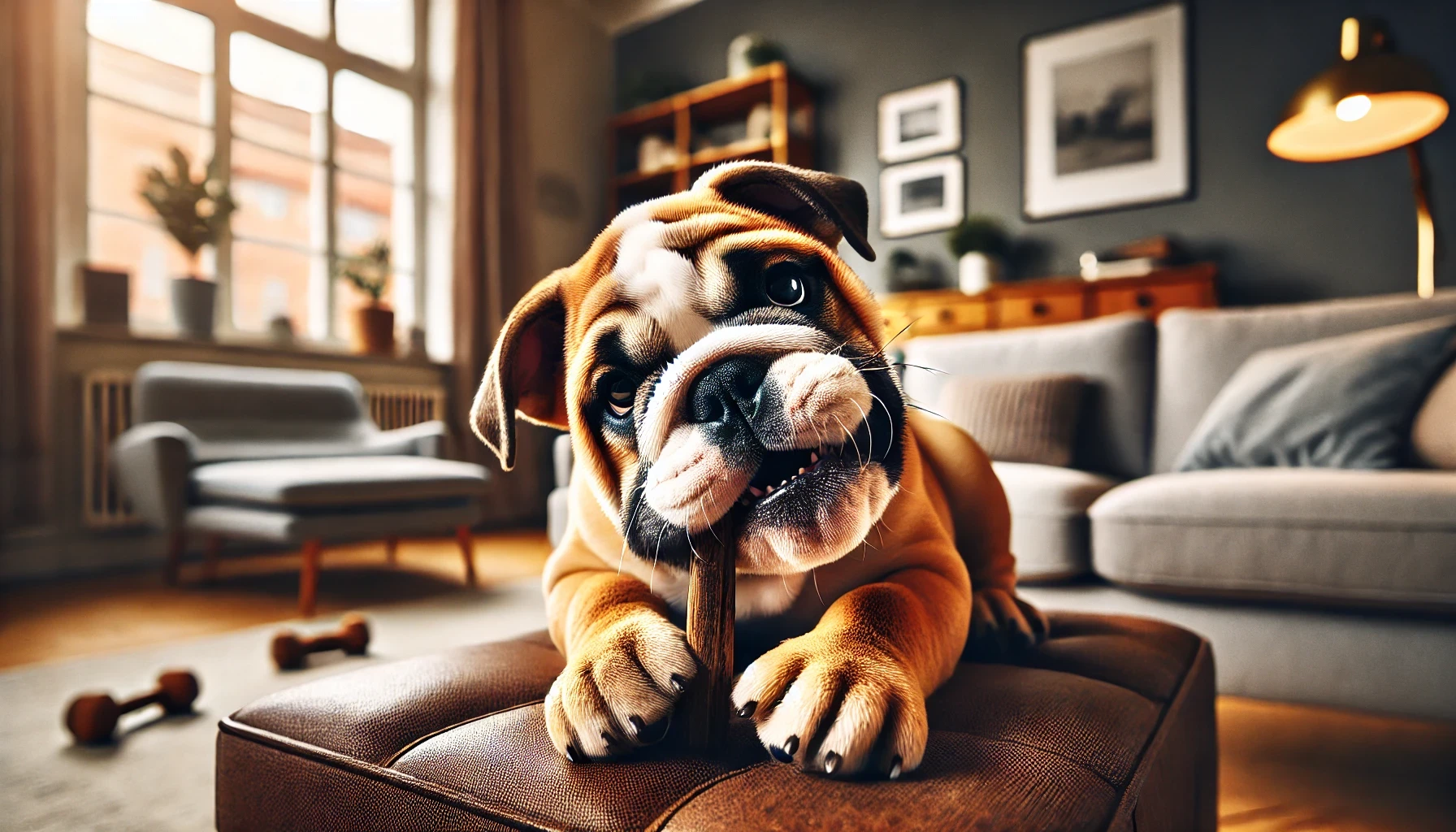On this page
Is It Normal for Bulldogs to Chew Furniture?
Yes, it is normal for Bulldogs, especially young puppies like your 10-month-old, to chew on furniture. Chewing is a natural behavior for dogs, particularly during their teething phase, which typically occurs between 3 to 7 months of age. However, when chewing continues past this period, it could indicate an underlying issue such as boredom, anxiety, or a lack of proper training.
As Bulldogs mature, they may still chew due to instinct or due to unmet needs. This article will explore the reasons why your Bulldog might chew excessively on furniture and provide you with effective solutions to stop this behavior and protect your belongings.
Why Do Bulldogs Chew Furniture as Puppies?
Yes, Bulldogs, like all puppies, chew furniture as part of their normal teething process.
Between 3 and 7 months, Bulldogs experience a teething phase where their baby teeth fall out, and adult teeth start to grow in. This discomfort often leads to chewing as a way for them to relieve pain. While this behavior is temporary, it can still cause damage to your furniture and belongings if not redirected appropriately.
What’s Happening During Teething?
Pain Relief: Chewing helps soothe sore gums.
Exploring the World: Puppies explore their environment by chewing and biting.
Need for Chew Toys: Puppies need appropriate items to chew on to avoid chewing on furniture.
Could Your Bulldog’s Chewing Be a Sign of Boredom?
Yes, boredom is a common cause of excessive chewing in Bulldogs.
Bulldogs are intelligent and energetic dogs, and without sufficient mental and physical stimulation, they may resort to chewing on furniture to entertain themselves. This behavior often escalates if your Bulldog is left alone for long periods or doesn’t receive enough exercise or interaction.
How to Prevent Boredom-Induced Chewing
Increase Exercise: Bulldogs need daily walks, play sessions, and mental challenges.
Interactive Toys: Provide toys that stimulate their mind, such as puzzle feeders or treat-dispensing toys.
Regular Engagement: Spend time playing and training with your dog to keep them mentally active.

Could Anxiety Be Causing Your Bulldog to Chew Furniture?
Yes, anxiety and stress can lead to destructive chewing in Bulldogs.
Bulldogs, like many dogs, can suffer from separation anxiety or stress when left alone, or they might chew out of fear. This can cause them to engage in undesirable behaviors such as chewing on furniture, shoes, or other household items. Identifying the root cause of the anxiety is crucial to addressing the behavior.
Signs Your Bulldog May Have Separation Anxiety
Excessive barking or whining when left alone.
Destructive behavior like chewing or digging.
Drooling, panting, or pacing.
How to Address Anxiety-Related Chewing
Gradual Training: Train your Bulldog to feel comfortable with alone time by gradually increasing the duration you leave them alone.
Safe Space: Create a calm, quiet area with comfortable bedding and toys when you’re away.
Consult a Vet: In severe cases, your vet may recommend calming products or medications.
Are Bulldogs Prone to Chewing Due to Their Natural Instincts?
Yes, Bulldogs may chew due to natural instincts, especially if they have not been taught proper chewing habits.
Bulldogs, like all dogs, have a natural instinct to chew. This is an important behavior for them to exercise their jaw muscles and keep their teeth clean. However, without proper training or supervision, this natural instinct can translate into excessive chewing on furniture and other items around the house.
How to Redirect Natural Chewing Instincts
Provide Appropriate Chew Toys: Offer durable chew toys that satisfy their need to chew without damaging furniture.
Supervised Playtime: Watch your Bulldog while they explore and play, intervening if they start chewing on furniture.
Positive Reinforcement: Reward your Bulldog when they chew on the right items, reinforcing good behavior.
Could Medical Issues Be Contributing to Your Bulldog’s Chewing?
Yes, sometimes excessive chewing may indicate underlying medical problems.
While it’s often behavioral, excessive chewing can occasionally be linked to medical issues. Conditions like dental pain, gum disease, or gastrointestinal discomfort can drive a Bulldog to chew excessively. If your dog’s chewing behavior changes suddenly or is accompanied by other symptoms, it may be worth consulting a vet.
Health Issues Linked to Excessive Chewing
Dental Issues: Pain from tooth decay or gum disease can cause chewing.
Digestive Problems: Some dogs chew due to nausea or stomach discomfort.
Infections or Injuries: Dogs may chew to alleviate discomfort caused by infections or injuries in their mouths.

How to Stop Your Bulldog from Chewing Furniture?
Yes, it’s possible to stop your 10-month-old Bulldog from chewing excessively on furniture, but it requires understanding the cause and taking appropriate steps.
Key Takeaways
Teething is a common cause of chewing in puppies.
Boredom, anxiety, and natural instincts may also contribute to the behavior.
Providing chew toys, increasing exercise, and addressing anxiety can help curb furniture chewing.


